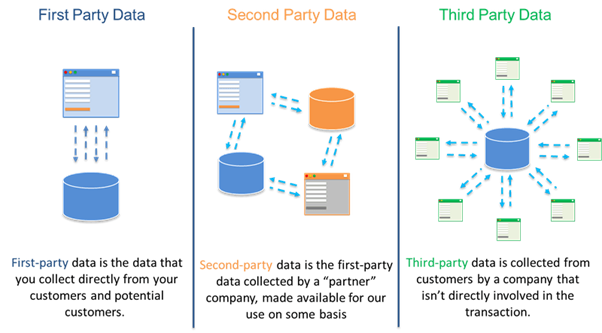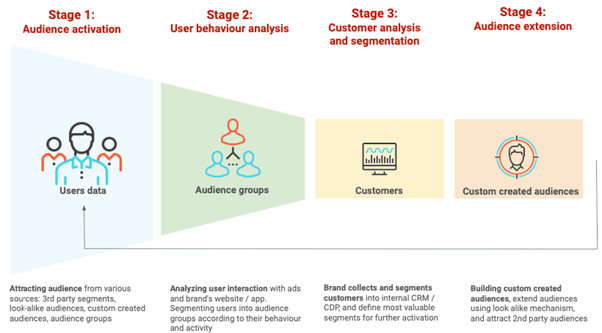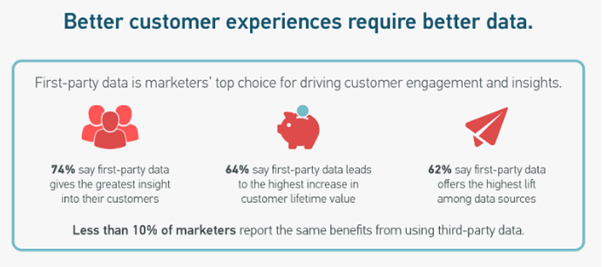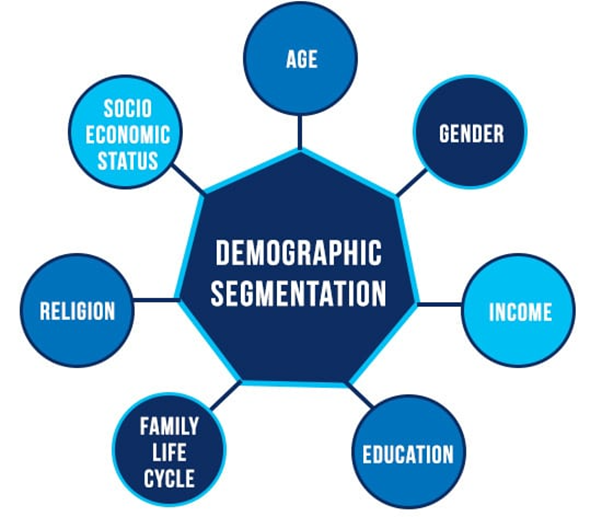Are you struggling to target the right audience with your marketing campaigns? Are you tired of wasting resources on irrelevant ads that don't convert? If so, it's time to consider using first party data vendors. These vendors provide valuable insights into your client base by collecting and analyzing data directly from your website and other sources.
First party data has become increasingly important in SEO-focused marketing campaigns. By using a first party data vendor, you can gain valuable insights into your target audience and better understand how they interact with your website. This data can help you craft more effective campaigns and optimize your content syndication strategies to better reach your target audience. Additionally, by using first party data you can more accurately target your campaigns, ensuring that your resources are being used in the most effective way to reach more qualified leads. With first party data, you can also gain a better understanding of how your customers interact with your website and the rest of your digital presence, so you can strategically tailor your campaigns to better reach your target audience.
In this blog post, we'll explore how utilizing first-party data can help improve the effectiveness of your marketing campaigns and why working with a vendor is a smart investment for any business owner. Let's dive in!
A Basic Definition of First-Party, Second-Party, & Third-Party Data
First-party data is data collected by a company from its own customers. This data can include web analytics, website visits, customer purchases, in-store visits, and more. It is data collected directly from the source and is owned by the company. First-party data is the most accurate, reliable, and secure when it comes to SEO-related activities. This data is owned and controlled by the company, so it can be used for more precise targeting and analysis.
Second-party data is data that is shared between two companies, usually through an agreement. This data is shared to benefit both companies.
Third-party data is data collected from sources outside the company, such as data brokers and other websites. This data can be used for marketing and research purposes, but it is important to ensure the data is accurate and up-to-date.

First party data is data collected from within an organization, such as from customers, website visitors, or other individuals directly associated with the organization. This type of data is often collected through surveys or website analytics, and can include a wide range of information, such as demographic information, purchase history, and preferences.
Second party data is data that is collected from a partner or provider, such as a vendor or service provider. This type of data can help to provide a more complete picture of customer behavior and preferences, as well as provide insights into how the organization can better serve its customers.
Finally, third party data is data collected from a third party such as a research firm, public records, or social media. This type of data is useful for gaining an understanding of customer behavior and preferences as well as providing insights into potential new markets.
Explanation of First-party data and its Importance
First party data is data that is collected by a company about its own clients their purchase history and interactions. This data is considered to be the most valuable type of data because it is the most accurate and complete representation of a company’s client profile based on demographic and firmographic criteria. First-party data can be used for a variety of purposes, including targeted marketing, product development, and client segmentation. It can also be used to create custom audiences for advertising on social media platforms.
One of the benefits of first party data is that it can be used to create highly targeted marketing campaigns. Because this data is collected directly from clients, it contains detailed information about their preferences and marketplace behaviors. This allows companies to create advertisements and offers that are specifically personalized to each client's needs.
According to the first-party data case study based on a mid-sized organization, when information is acquired responsibly and with privacy in mind, consumers are prepared to provide more of it.
About first-party data Google-commissioned Narrative Strategies poll of 11,000 people in 11 countries, states that 86% of consumers will be loyal to a company if it is honest about the data it obtains, such as via installing an app or purchasing from the brand on a regular basis.
Another benefit of first-party data is that it can be used to improve the accuracy of client segmentation. Segmentation is the process of dividing clients into groups based on shared characteristics. First-party data programmatic advertising can be used to create more accurate segments by including detailed information about each client's individual preferences and behaviors.

Overall, first-party data programmatic advertising is an important tool for marketers because it provides accurate insights into client behavior and preferences. This type of data can be used to create more targeted and effective marketing campaigns.
Importance of First-party Data Vendors for Marketing Campaigns
First-party data vendors offer a unique and valuable perspective on consumers that can help improve marketing campaigns and keep you ahead of your competitors. They collect data directly from consumers through surveys, questionnaires, and other research methods. This data is then used to develop marketing strategies and messages that are more likely to resonate with consumers. When used correctly, first-party data can be a powerful tool for marketers looking to improve their campaigns and drive better results.
Benefits of using First-party Data Vendors
There are a number of benefits to using first-party data vendors.
• First, they can help you obtain accurate and up-to-date information about your clients. This is invaluable for developing targeted marketing campaigns
• Additionally, first-party data vendors can help you track client behavior over time, allowing you to better understand how they interact with your brand. This information can be used to improve your overall marketing strategy and leverage intent data.

• Finally, first-party data vendors often offer other services such as customer segmentation and profiling, which can further improve the effectiveness of your marketing campaigns
Better Audience Segmentation
As a marketer, one of your primary goals is to deliver the right message to the right people at the right time. To do this effectively, you need to be able to segment your audience into smaller groups so that you can tailor your message to each group.
One way to segment your audience is by using first-party data vendors. First-party data vendors are companies that collect data directly from consumers. This data can be used to segment your audience into smaller groups so that you can deliver a more personalized message to each group.
First-party data vendors offer a variety of benefits that can help improve your marketing campaigns. They can provide detailed information about consumer behavior, preferences, and demographics. This information can be used to segment your audience into smaller groups so that you can deliver a more personalized message to each group.

If you're looking for ways to improve your marketing campaigns, consider using first-party data vendors. Their insights and capabilities can help you segment your audience so that you can deliver a more personalized message to each group.
Improved Personalization
In order to improve your marketing campaigns, you need to have a clear understanding of your target audience. First-party data vendors can help you obtain this understanding by providing detailed information about your clients. This information can include demographics, interests, and even purchase history.
With this data, you can create more targeted marketing campaigns that are more likely to result in conversions. You can also use first-party data to create personalized messages for your target audience. By doing this, you will further improve the likelihood of conversion and build better relationships with your clients.
Enhanced Ad Targeting
As the name suggests, first-party data vendors help you to target your marketing campaigns more effectively by providing you with accurate and up-to-date information about your potential customers. By understanding your target audience better, you can create more targeted and personalized ads that are more likely to grab their attention and convert them into customers.
In addition, first-party data vendors can also help you track the performance of your marketing campaigns in real time so that you can make necessary adjustments to improve your ROI.
Higher Engagement Rates
First-party data vendors help improve your marketing campaigns by providing you with high-quality, targeted data that can lead to higher engagement rates. When you have access to better data, you can create more targeted and effective campaigns that are more likely to resonate with your audience. With higher engagement rates, you'll be able to reach your marketing goals more effectively and efficiently.
Better ROI
You should consider 03 crucial categories of data listed below while creating your data strategy.
First-party data is gathered directly from customers through surveys, interactions with websites and emails, form filling, and lead-generation activities involving content. Clients' online behavior on social media platforms and other sources, like credit card companies and loyalty programs, are used to gather second-party data about them and third-party data refers to information gathered from open sources like census reports or demographic statistics.
Here’s a look at some of the ways they can help you get a better ROI:
1. They have high-quality data.
First-party data vendors collect their data directly from consumers. This means that the data is of the highest quality and is more accurate than data from other sources.
2. They offer targeted data.
First-party data vendors can provide you with targeted data that is specific to your target audience. This allows you to create more targeted marketing campaigns that are more likely to convert.
3. They provide detailed insights.
First-party data vendors offer detailed insights into consumer behavior. This information can help you fine-tune your marketing campaigns for better results. These insights also assist in building a cross-channel marketing strategy over time. By integrating the insight obtained from various touchpoints marketers evaluate the entire buyer's journey which leads to improved marketing performance.
4. They offer client support.
First-party data vendors typically offer customer support in case you have any questions or need help using their platform. This gives you peace of mind knowing that someone is there to help if you need it
Improved Client Retention
Client retention is one of the most important aspects of any business, and first-party data vendors can help improve your customer retention rates.
By using first-party data, you can get a detailed picture of your client’s needs and wants. This information can be used to create targeted marketing campaigns that are more likely to resonate with your customers. Additionally, first-party data can be used to track the results of your marketing campaigns and assess which ones are most effective at driving customer loyalty.
Data Privacy and Security
As a business, it’s important to keep your data privacy and security policies up to date. First-party data vendors can help you do this by providing tools and resources to protect your data. They can also help you create campaigns that are compliant with data privacy and security laws.
First-party data vendors can help you keep your data safe by providing:
• Data encryption: Data encryption is a process of encoding information so that only authorized users can access it. First-party data vendors can provide you with the tools you need to encrypt your data.
• Data backups: Data backups are copies of your data that are stored in a safe location in case your primary copy is lost or damaged. First-party data vendors can help you create and manage backups of your data.
• Data recovery: Data recovery is the process of restoring lost or corrupted data. First-party data vendors can provide you with the tools and resources you need to recover your data.
Competitive Advantage
As a marketer, you are always looking for ways to improve your campaigns and get ahead of your competition. One way to do this is by using first-party data vendors.
First-party data vendors are companies that collect data directly from consumers. This data can be used to create more targeted and effective marketing campaigns.
Some of the benefits of using first-party data include:
1. Increased accuracy - First-party data is more accurate than third-party data because it comes directly from the source. This means that you can target your audience more effectively and avoid wasted spend on ads that don’t reach the right people.
2. Better quality - First-party data is also of a higher quality than third-party data. This is because it is collected through surveys and other methods that ensure that the information is reliable.
3. Greater control - When you use first-party data, you have greater control over how it is used. You can share it with specific partners or keep it within your organization. This gives you more flexibility regarding how you use the data and who you share it with.
4. Enhanced privacy - First-party data is subject to stricter privacy laws than third-party data. This means that your customers’ information is better protected when you use first-party data vendors.
5. Cost-effective data- First-party data can be cheaper to collect than third-party data.
Steps to Select the Right First-party Data Vendors
The right first-party data vendors could become your trusted partner and share a strong business association in your growth journey. There are a few key factors to consider when selecting first-party data vendors:
1. Data Quality: Make sure the vendor you select has high-quality data that is relevant to your target audience. The last thing you want is to base your marketing campaigns on inaccurate or outdated information.
2. Data Freshness: It's also important to consider how fresh the data is that you're getting from the vendor. The fresher the data, the more accurate it will be in terms of predicting consumer behavior.
3. Cost: Of course, you'll also want to consider cost when selecting a first-party data vendor. Be sure to get quotes from multiple vendors so you can compare and find the most affordable option.
4. Customer Service: Last but not least, be sure to choose a vendor with great customer service. You should be able to easily get in touch with someone at the company if you have any questions or concerns.
Identify Your Business Needs
As a business owner, you are always looking for ways to improve your marketing campaigns and get more customers through the door. One way you can do this is by using first-party data vendors. These vendors can provide you with valuable information about your customers that you can use to tailor your marketing efforts.
Here are some things to consider when looking for a first-party data vendor:
What type of data do they collect?
- How is the data collected?
- How often is the data updated?
- What format does the data come in?
- Is the data accurate?
- Can the data be segmented?
Evaluate Vendor Reputation and Trustworthiness
There are a lot of data vendors out there. So, how do you know which one to trust?
When evaluating vendor reputation and trustworthiness, consider the following:
• Are they transparent about their data sources?
• Do they have a good track record with other customers?
• Do they have experience in your industry?
• Can they provide references?
Transparency is key when it comes to data vendors. You should be able to easily see where their data is coming from. If they're not forthcoming about their sources, that's a red flag.
Checking client reviews and testimonials can give you a good idea of what it's like to work with a particular vendor. Make sure to read both the positive and negative reviews to get a balanced picture.
Industry experience is also important. A vendor who knows your industry inside and out will be able to provide more targeted and accurate data. They'll also be better equipped to understand your unique needs and requirements.
Finally, ask for references from the vendor themselves. Once you've spoken to some of their past clients, you'll have a better idea of whether they're trustworthy.
Assess Data Quality
There are a number of factors to consider when assessing the quality of your data, including accuracy, completeness, timeliness, and consistency. First-party data vendors can help you improve the quality of your data by providing accurate and up-to-date information on your customers and prospects. They can also help you keep your data consistent by providing tools to help you standardize your data across different platforms.
Consider Vendor Capabilities and Expertise
There are a number of factors to consider when choosing a first-party data vendor, including their capabilities and expertise. Here are some things to keep in mind:
• Make sure the vendor has experience working with the type of data you're looking for.
• Ask about the vendor's process for acquiring and cleansing data.
• Inquire about the vendor's customer support policies and procedures.
• Do they have the required automation platforms and artificial intelligence tools to run your goal-oriented campaigns? Find out what kind of reporting and analytics tools the vendor offers.
By taking the time to evaluate vendors on these criteria, you can be sure to choose one that will be a valuable partner in helping you improve your marketing campaigns.
Evaluate Pricing and Contract Terms
When it comes to working with first-party data vendors, it’s important to evaluate pricing and contract terms before signing on the dotted line. Here are a few things to keep in mind:
• Make sure you understand what you’re paying for. Is it a one-time fee or recurring? Are there any limits on the amount of data you can purchase?
• Pay attention to the contract terms. What happens if you want to cancel early? Are there any hidden fees?
• Compare pricing across different vendors. You may find that one vendor is significantly cheaper than another, but make sure you’re comparing apples to apples in terms of quality and quantity of data.
By taking the time to evaluate pricing and contract terms upfront, you can be sure that you’re getting a good deal on first-party data that will help improve your marketing campaigns.
Conclusion
Utilizing first-party data is becoming increasingly important for online businesses that want to stay ahead of the competition and maximize their ROI. S2W Media partners with companies as their first-party data vendors. In this process, our team of experts helps you improve your marketing campaigns with high-quality and reliable insights into client behavior. By leveraging the power of this data in combination with othertools such as analytics platforms and segmentation tools, we set an environmentwhere you can gain a deeper understanding of your client, allowing you tocreate personalized experiences that engage them more effectively.


